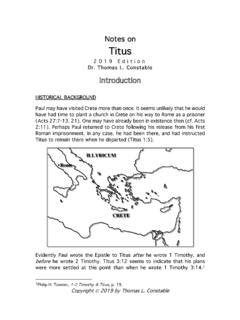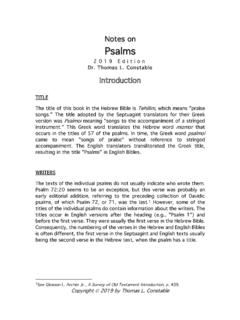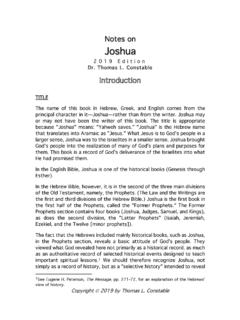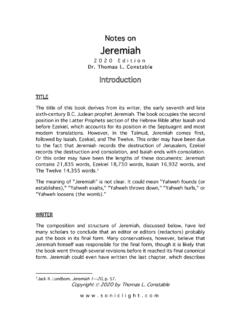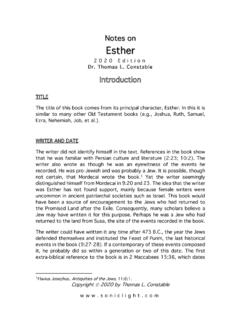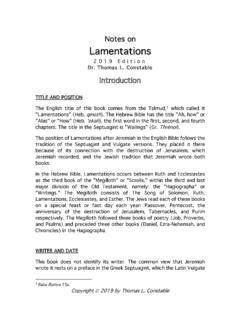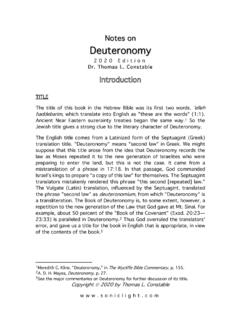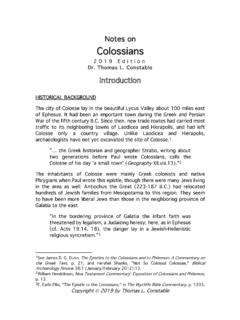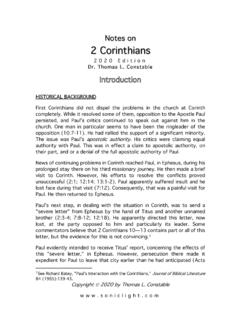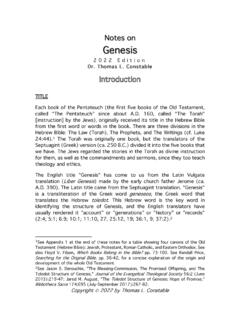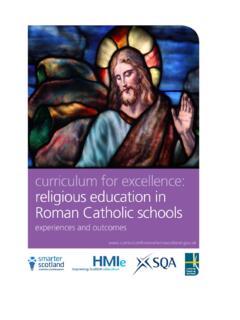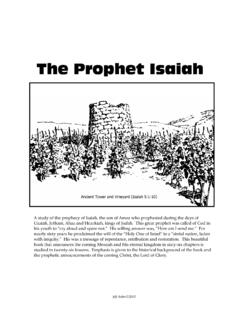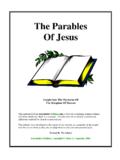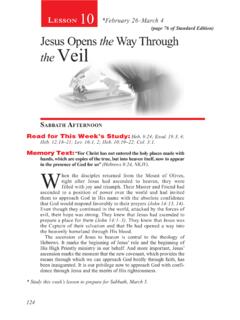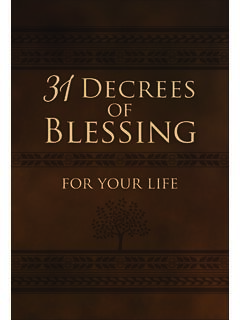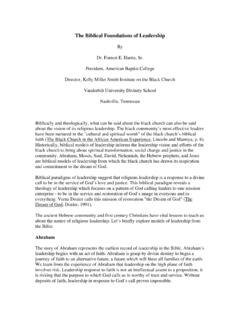Transcription of Notes on Isaiah - Plano Bible Chapel
1 Copyright 2021 by Thomas L. Constable Notes on Isaiah 2021 Edition Dr. Thomas L. Constable TITLE AND WRITER The title of this book of the Bible , as is true of the other prophetical books, comes from its writer. The book claims to have come from Isaiah (1:1; 2:1; 7:3; 13:1; 20:2; 37:2, 6, 21; 38:1, 4, 21; 39:3, 5, 8), and Jesus Christ and the apostles quoted him as being the writer at least 21 times, more often than they quoted all the other writing prophets combined. There are also many more quotations and allusions to Isaiah in the New Testament without reference to Isaiah being the writer. Kenneth Hanna wrote that there are more than 400 quotations from or allusions to the Book of Isaiah in the New J.
2 A. Alexander noted that 47 of the 66 chapters of Isaiah are either quoted or alluded to in the New Testament, and that the 21 quotations attributed directly to Isaiah were drawn from chapters 1, 6, 8, 9, 10, 11, 29, 40, 42, 53, 61, and The only Old Testament book referred to more frequently than Isaiah in the New Testament is Psalms. "It would be difficult to overstate the importance of Isaiah for the Christology of the church."3 The name of Isaiah , the son of Amoz, is the only one connected with the book in any of the Hebrew manuscripts or ancient versions. Josephus, the Jewish historian who wrote at the end of the first century , believed that Isaiah wrote this book. He said that Cyrus read the prophecies that Isaiah had written about him and wished to fulfill Josephus' 1 Kenneth G.
3 Hanna, From Moses to Malachi, p. 346. 2J. A. Alexander, Commentary on the Prophecies of Isaiah , 1:13. 3 Tremper Longman III and Raymond B. Dillard, An Introduction to the Old Testament, p. 319. 4 Flavius Josephus, Antiquities of the Jews, 11:1:1-2. 2 Dr. Constable's Notes on Isaiah 2021 Edition statement is not necessarily true, but it does show that Josephus believed that Isaiah wrote Isaiah . There is no record of any serious scholar doubting the Isaianic authorship of the entire book before the twelfth century when Ibn Ezra, a Jewish commentator, did so. With the rise of rationalism, moreover, some German scholars took the lead in questioning it in the late eighteenth century. They claimed that the basis for their new view was the differences in style, content, and emphases in the various parts of the prophecy.
4 Many scholars have noted that it is not really the text itself that argues for multiple authorship as much as the presence of predictive prophecy in chapters 40 66, which antisupernaturalistic critics try to explain away. Many modern rationalistic critics believe the purpose of prophetic literature is simply to call a particular people to faith in God, not to predict the future. However, if the prophets did not predict the future, their theology is questionable. They frequently claimed that the fulfillment of their predictions would validate their theology, and it did. Six times in Isaiah God claimed the ability to predict the future (42:8-9; 44:7-8; 45:1-4, 21; 46:10; 48:3-6).
5 The English word "prophecy" comes from the Greek prophemi, which means "to say before or beforehand." Before Samuel, prophets were normally called seers, because they could see into the future, with God's help. Form critics have distinguished three basic types of prophetic oracles or messages. These are: oracles of judgment ( , most of the Book of Nahum), oracles of repentance ( , much of the Book of Jeremiah), and oracles of salvation ( , the Abrahamic and Davidic Covenants). Someone has said that "prophecy is the mold into which history is poured." At first, critics of the Book of Isaiah hypothesized that the respective emphases on judgment in chapters 1 39 and consolation in chapters 40 66 pointed to two separate writers: Isaiah and "Deutero- Isaiah .
6 " With further study, a theory of three writers ("Trito- Isaiah ") emerged because of the differences between chapters 40 55 and 56 These critics conceived addresses to three different historical settings by three different individuals in these three parts of the book: Isaiah 's lifetime (ca. 739-701 ; chs. 1 39), the Babylonian exile (ca. 605-539 ; chs. 40 55), 1 See, for example, Gerhard von Rad, Old Testament Theology, 2:295. 2021 Edition Dr. Constable's Notes on Isaiah 3 and the return (ca. 539-400 ; chs. 56 66).1 Many modern commentators still hold this three-writer hypothesis. "Along with what is known as the JEDP theory of the origins of the Pentateuch, the belief in the multiple authorship of the book of Isaiah is one of the most generally accepted dogmas of biblical higher criticism today.
7 "2 One can make a case for Isaiah writing chapters 1 39 in preparation for the exile, chapters 40 55 as though he were in exile, and chapters 56 66 as though he were living after the exile. But that does not mean three different writers wrote these sections. Here is a chart of how "normative" biblical criticism dates Isaiah and some other Old Testament Epoch Literature Pre-exilic (760-586 ) Early Amos Hosea First Isaiah (chs. 1 35) Micah Psalms of Zion (Pss. 46, 48, and 87) Late Jeremiah Exilic (586-539 ) Early Jeremiah 1 See Eugene H. Merrill, "Survey of a Century of Studies on Isaiah 40 55," Bibliotheca Sacra 144:573 (January-March 1987):24-43; idem, "Literary Genres in Isaiah 40 55," Bibliotheca Sacra 144:574 (April-June 1987):144-55.
8 2 John N. Oswalt, The Book of Isaiah , Chapters 1 39, p. 17. One modern commentator on Isaiah who advocated this approach is John D. W. Watts. 3 Adapted from Bruce K. Waltke, "Micah," in Obadiah, Jonah, Micah, p. 170. 4 Dr. Constable's Notes on Isaiah 2021 Edition Deuteronomist (Deuteronomy 2 Kings) Ezekiel Late Second Isaiah (chs. 40 55) Post-exilic (516 ?350 ) Early Zechariah Haggai Third Isaiah (chs. 56 66) Ezra-Nehemiah Late Malachi Joel Before the Dead Sea Scrolls were discovered in 1947, the oldest Hebrew manuscripts of the Old Testament that were known were produced in the ninth century The reason that so few older copies of these Bible books existed is that the Jews normally "retired" old copies of their Scriptures, placed them in a "genizah" (repository for sacred writings), and eventually burned them.
9 One of the Dead Sea Scrolls is the so-called St. Mark's [Monastery] manuscript of Isaiah . "The St. Mark's manuscript of Isaiah is the only one of the scrolls that contains a whole book of the Bible , and, with the exception of some of the small fragments [of other manuscripts that were discovered], it is the oldest of the manuscripts found in the caves."2 Millar Burrows dated this manuscript of Isaiah "from a little before 100 , or possibly a little later."3 This shows that the Book of Isaiah was at that time a unified document. This does not prove single authorship, but it lends 1 Millar Burrows, The Dead Sea Scrolls, p. 302. 2 Ibid., p. 303. 3 Ibid., p. 118. 2021 Edition Dr.
10 Constable's Notes on Isaiah 5 weight to the argument of conservative scholars that one person wrote the whole book. Internal and external evidence points to the unity of authorship. The title for God, "Holy One of Israel," which reflects the deep impression that Isaiah 's vision in chapter 6 made on him, occurs 12 times in chapters 1 39 and 14 times in chapters 40 66, but only seven times elsewhere in the entire Old Testament. Other key phrases, passages, words, themes, and motifs likewise appear in both parts of the Jewish tradition uniformly attributed the entire book to Isaiah , as did Christian tradition until the eighteenth century. The St. Mark's manuscript of Isaiah has chapter 40 beginning in the same column in which chapter 39 All the major commentaries and introductions deal with the unity Isaiah lived in Jerusalem, and that capital city features prominently in his prophecies.
